 DISCUSSION: What is a work? John Dante Prevedini leads a discussion about The performing artist as co-creator, including contributions from Halida Dinova, Yekaterina Lebedeva, Béla Hartmann, David Arditti and Stephen Francis Vasta.
DISCUSSION: What is a work? John Dante Prevedini leads a discussion about The performing artist as co-creator, including contributions from Halida Dinova, Yekaterina Lebedeva, Béla Hartmann, David Arditti and Stephen Francis Vasta.
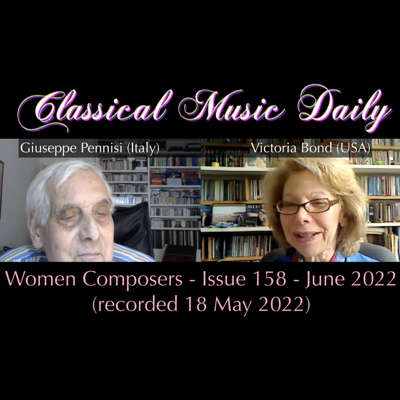 VIDEO PODCAST: Women Composers - Our special hour-long illustrated feature on women composers includes contributions from Diana Ambache, Gail Wein, Hilary Tann, Natalie Artemas-Polak and Victoria Bond.
VIDEO PODCAST: Women Composers - Our special hour-long illustrated feature on women composers includes contributions from Diana Ambache, Gail Wein, Hilary Tann, Natalie Artemas-Polak and Victoria Bond.
- Francisco Gustavo Sánchez Gomes
- The Firebird
- Navona Records
- Beck
- Jacob Liebmann Beer
- Metier Sound and Vision Ltd
- Champs Hill
- Michelle Cann
Superb and Imaginative Playing
RODERIC DUNNETT marks Thomas Trotter's forty years as Birmingham City Organist by reviewing a special anniversary recital and investigating the artist's large output on the Regent Records label
Thomas Trotter, the celebrated virtuoso English organist, has just achieved a milestone in his career. This year he has completed forty years as Birmingham City Organist: as he put it, 'my dream job'. And while a tribute in his honour by other forces, such as his performing with the City of Birmingham Symphony Orchestra - he has performed and recorded with many top ensembles - would have been well deserved, it was Trotter himself who, in association with B:Music, the charity responsible for the second city's two main concert venues, took to the Symphony Hall podium to treat his audience to yet another solo display, a celebration of both music he specially loves, and of this special occasion, but above all showcasing his dazzling finesse as a performer.

Thomas Trotter. Photo © Adrian Burrows
Trotter's very active role has been to perform regularly on each of Birmingham's superb four-manual organs, the one at the beautifully refurbished Greek architecture-inspired Town Hall, which has stood since it opened in 1834 on what became only days before the Queen's death in 1901, Victoria Square, shining throughout Mendelssohn and Dvořák's time, and which has the most splendid and vivid, restored Victorian organ case; and on the organ of Symphony Hall, still looking sparkling new, its horizontal trumpets thrusting through from the smart case to provide a dazzling effect.
Symphony Hall's organ - designed and built employing historic craftsmanship by the German company Johannes Klais Orgelbau, and where Trotter gave this significant anniversary recital, is surely stupendous enough to be compared with the famous Aristide Cavaillé-Coll 'symphonic organs' in Paris - the Madeleine, Sainte-Clotilde, Saint-Sulpice - his largest - and the cathedral of Notre-Dame.
To summarise some of Thomas Trotter's arresting programme on that memorable evening of Friday 6 October 2023: two Fantasias and Fugues, at the outset Bach's G minor - one of his best known organ works, with a famous fugue, as perky as a Gigue, to which parodying students appended the nickname 'Old Ebenezer Prout, he is a silly man' (Prout was actually an eminent English teacher, editor and executant in the late nineteenth century); the other, Franz Liszt's greatest work for organ, also a Fantasia and Fugue.
There was Thomas Trotter's rather tentative Schumann (although certain of his Sketches, Fugues and works for Pedal Piano are quite touching). Far more interesting was Trotter's championing, here and on Regent Records, of the Anglo-American Edwin Lemare's adaptation for organ of numerous orchestral works. In fact Trotter has made almost as many, possibly more, himself. He has openly (and warmingly) declared that while this process has been relatively out of fashion recently, it deserves resurrecting. How right he is: one of his many bold undertakings on Regent.
But here, out of many Lemare reimaginings for organ of Wagner, Trotter plumped for the overture to Wagner's gargantuan early opera Rienzi. It's a very substantial piece, long for an overture although perhaps not long for its time - Beethoven, Weber, Spohr, Spontini - and most appetising for a typically spacious and alluring Wagnerian melody - The Flying Dutchman, The Mastersingers - rising out of the wash, to which Trotter brought lovely colouring and a splendid legato, all of it alluring and fascinating.
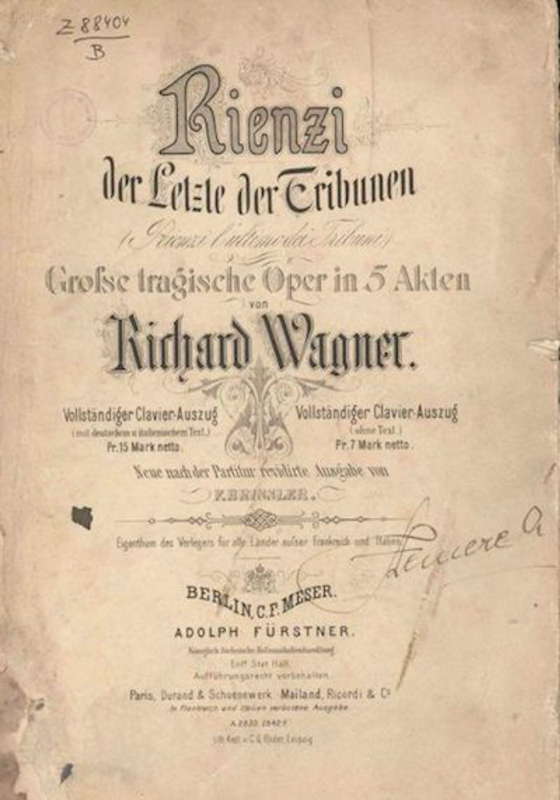
The original poster for Wagner's
opera Rienzi (Dresden, 1842)
Thomas Trotter has performed another invaluable service, by commissioning not a few, but many new works for organ, offering a chance to a good many established or aspiring composers of all ages. And so it was here.
Thus his recital's central highlight was a new piece specially composed by the astoundingly accomplished Cheryl Frances-Hoad, whose honours include Research Fellow at first Merton, where she composed her Cello Concerto in 2022 for Laura van der Heijden, and now Keble College, Oxford, and before both, having composed music since she was very young, was a pupil at the Yehudi Menuhin School and then a student at Gonville & Caius College, Cambridge.
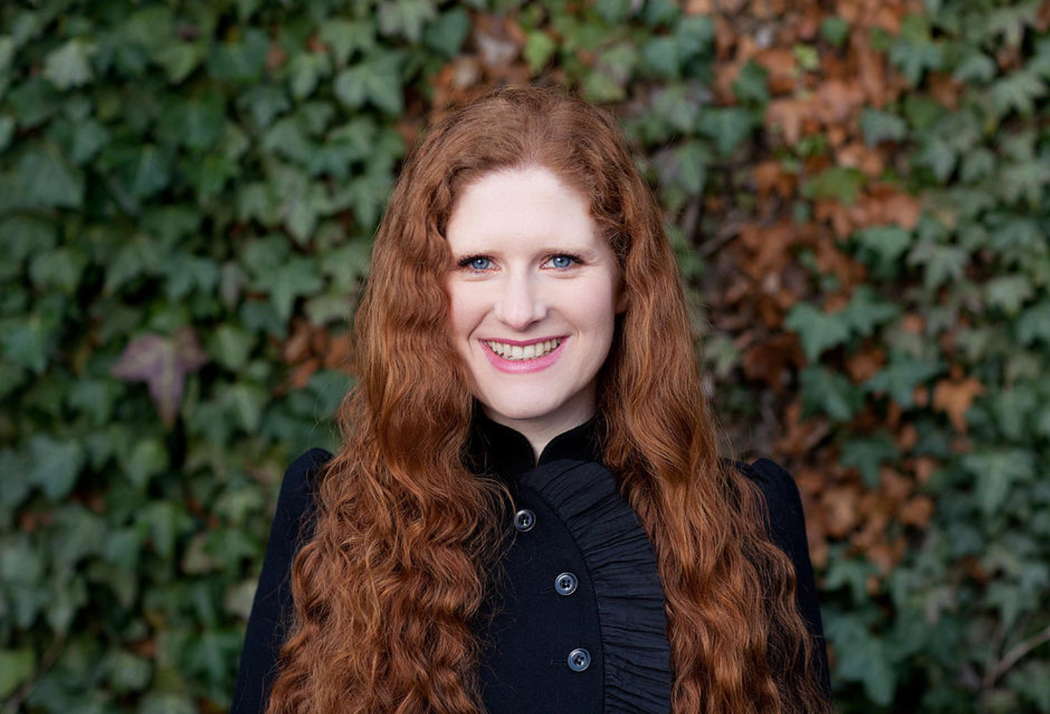
Cheryl Frances-Hoad, brilliant composer of Rhapsody on the name of Thomas Trotter, which received its first performance at this concert
Her first idea - surely hers, but her proposals doubtless rooted in discussions beforehand - was to engineer a piece incorporating two main features - firstly, basing her work on the name T-R-O-T-T-E-R (or perhaps 'Thomas Trotter?')
How does one achieve that? One sophisticated way, often employed in the past, is to make use of sol-fa (or solfège), which supplies the letters U(t)-R-M-F-S-L-T-D (do, re, mi, etc); otherwise the alphabet, C-D-E-F-G-A-B. And a double bonus: B flat is denoted by H (hence B-A-C-H). E flat is also known as 'Es', or 'S'. Plus arguably O (do, or sol) and I (mi). In all, these add up to A, B, C, D, E, F, G, H, I, L, M, O, R, S, T and U. So 'Trotter' is achievable by mixing the two methods. 'Thomas', likewise.
Whether this is the method Cheryl Frances-Hoad employed, or something slightly different and clever, isn't certain. But if his name yields B-Bb-C(or G)-E-A-Eb B-D-C(or G)-B-B-E-D, it would explain why (as Trotter himself indicated when introducing) the melody emerged excitingly spooky and perky: like fragments of a serial work, jagged, jerky, chromatic-feeling, exciting, dramatic and fun, especially as it permits, or yields, wide, or powerful intervals like a diminished fifth and major seventh.
Cheryl Frances-Hoad's new work for the occasion was indeed exciting, varied, vital, unpredictable, even wild. Here and there, tongue-in-cheek: a nice slice of mischief. There was plenty of scampering for Trotter to do, on keyboards and pedals.
But as a special feature and super, original idea, Frances-Hoad decided to feature ten events from the past four decades - the Trotter era - of Birmingham's history. For a start, his appointment and this forty-year celebration. But also key moments such as the opening of Symphony Hall, and the unveiling of the city's tallest building, and its commanding new library.
Perhaps the most loving detail set out to capture a leafy element: a kind of Intermezzo, inspired by Birmingham's world-famous Botanical Gardens - sixty thousand square yards or, roughly, metres, can you believe it; plus aviary - and its unique 'Dickson lathamii fern tree', a hybrid actually created here in Birmingham by the latter nineteenth century curator, being revealed. What an enchanting (and highly original) feature to set out to capture in music.

The Dicksonia-x-lathamii fern or tree,
seen at Birmingham's famed Botanical Gardens
However I chose another highlight: a wonderfully spiky, pointilliste passage in the first or probably second movement (of ten), which Trotter registered so cleverly with mixtures and who knows - two foot stops? One foot? It was a thrill to hear. What clever writing. What a treat for this (or any) audience.
After Liszt's stunning, half hour-long Fantasia and Fugue Ad nos, ad salutarem undam, Trotter's final encore, Charles-Marie Widor's Toccata from Symphony No 5, was of course equally spectacular, and great fun to conclude a really uplifting recital by a superlative performer.

Now for a second dramatic unveiling: the same night, Trotter was able to introduce and sign a new disc from the brilliant Regent Records, issued to celebrate his forty years: 'Thomas Trotter - A Celebration' (REGCD 584). Here on Regent Records his striking interest in 'transpositions', or arrangements - witness Lemare above - has led him to turn his hand to them himself ... lots and lots of them.
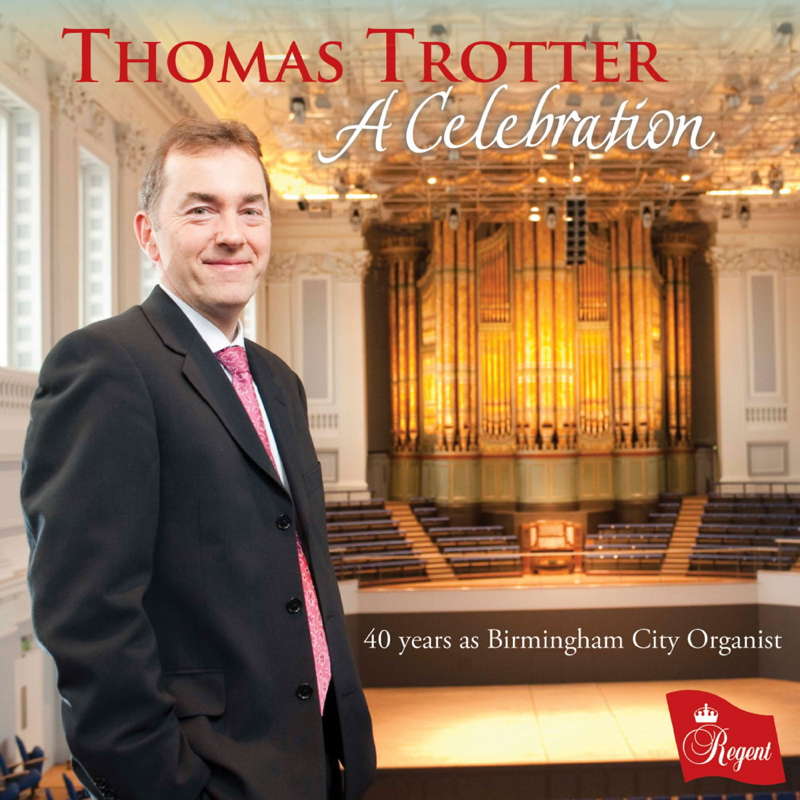
Regent Records' special tribute to a great organist.
Thomas Trotter - A Celebration on REGCD 584.
© 2023 Regent Records
Three items on this desirable disc are such transformations. One is Trotter's own treatment for organ of Holst's The Planets - the 'Jupiter' (fourth) movement. It's a deft piece of transliteration, and includes, of course, the tune which became, very shortly and movingly after the Great War (1921), the hymn tune 'I vow to Thee, My Country'. (Sir) Adrian Boult conducted the work's premiere, believe it or not, just twelve days before the 'triple eleven' Armistice: at 11am on the eleventh day of the eleventh month - November 1918 - upon which the horrors came to an end. Holst's Planets suite became one of the biggest 'hits' in all classical music.
Its fourth movement, 'Jupiter', is dubbed for some reason 'The Bringer of Jollity': he sounds like Falstaff. Possibly to capture 'Saturn, The Bringer of Old Age', Holst's own favourite, or the concluding 'Neptune, the Mystic') might be an even superior challenge for Trotter's amazing gift for instrumentation - organ 'registration'. But his naturally superb and imaginative playing throughout rendered Jupiter a highlight of this Regent disc.
There's more: a six-minute minimalist contemporary piece by the fabulously accomplished South African (subsequently Irish) composer Kevin Volans: it's a vividly fresh idea of Trotter's to include something of that kind. Another arrangement is of the Overture to Mendelssohn's lesser-known largescale oratorio - he planned more - St Paul, transformed for organ by, like Lemare, another outstanding Victorian organist, William (W T) Best. Handel transcriptions were his own favourite.
A disc doubly effective for its bracing second half: Thomas Trotter has included another of his energised, to a degree witty, arrangements, a sort of 'oompah' piece by Eric Coates (who actually composed a lot more than The Dam Busters March). It's called the Knightsbridge March, and was used as the signal tune for a famous, long-running UK BBC Home Service (news and documentary) programme entitled In Town Tonight.
It's a laugh, again one of the best things on this recording. So is Madeleine Dring's chirpy Caribbean Dance. (Trotter's registration of this is brilliant.) Healey Willan (1880-1968) took off for Canada and became a big name as an organist in Toronto. He composed no fewer than fourteen settings of the Missa Brevis (Mass without the Credo), a flood of church anthems, seven operas, two symphonies, etc, etc.
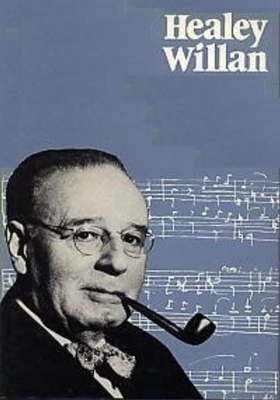
Healey Willan, composer of many church anthems,
and organist and choirmaster of St Paul's church,
Toronto, and latterly of St Mary Magdalene
Willan's Introduction, Passacaglia and Fugue is his still most famous organ work. It deserves its reputation, even if not over-exciting. The eight-minute central Passacaglia does have its moments, but like Hubert Parry's Fantasia and Fugue in G, with which this disc commences, it's of only some interest. However partway through it makes a big noise. Arguably Willan's voluble final Fugue is more successfully Bach-inspired.
Valse mignonne is by no means Siegfried Karg-Elert's most effective piece, but it's a noble attempt at being light-hearted by this eminent German composer (1877-1933). Trotter can appear at his best when he pulls out the Tremulant stop. Somewhere between emotive and sleazy, he is able to use it to make things sound like a cinema organ. That's the fun bit. Better perhaps (also on 584), Quebec-born composer Rachel Laurin, who died aged sixty-two only two months ago. One wonders if she was able to hear Trotter's pirouetting performance of her Étude héroique on this disc, but he's played it several times before, so maybe she got a glimpse then.
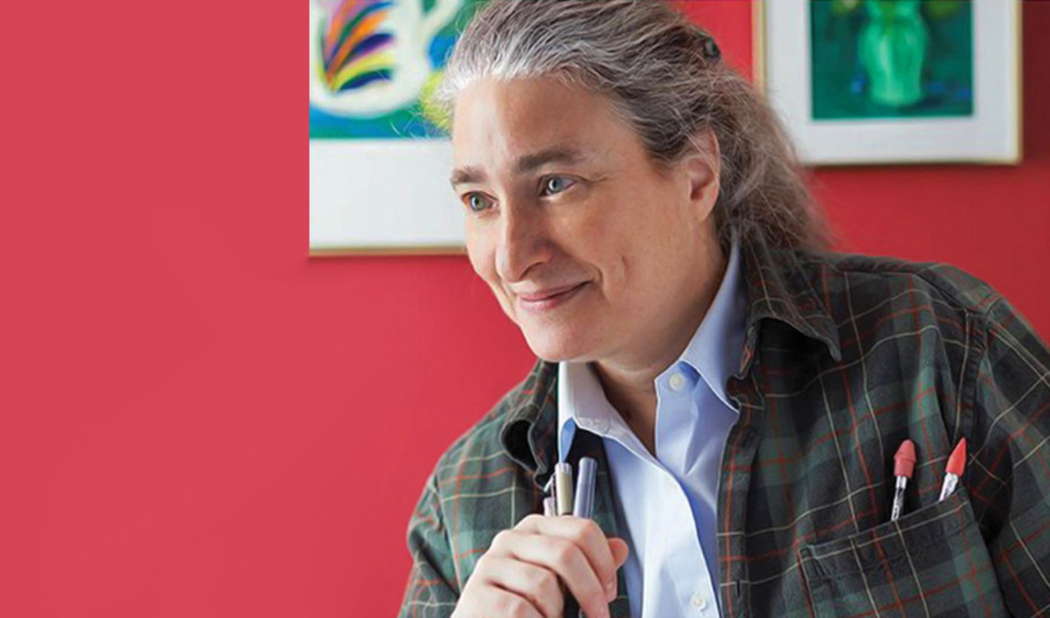
Quebec-born composer Rachel Laurin (1963-2023)
There's a lot of punch in this scintillating work, described in the record's sleeve notes as 'exhilarating'; and at eight minutes long on this definitive Regent recording it's very good news, as it holds you for every second - certainly in Trotter's brilliantly exciting performance here. Laurin's striking fifteen-minute Sweelinck Variations - based on the celebrated Dutch composer - form the climax to another Trotter disc, REGCD 566 - as usual, finely recorded.
So the best bits on REGCD 584 are eminently worthwhile. But one has also to welcome Trotter's many high-quality additional performances on Regent Records, some with attractive or fancy titles: 'Restored to Glory' (265, which includes his Birmingham concert's delicious Rienzi overture), 'Grand Organ Prom' (322), 'Symphony Hall Sorcery' (566), 'Sounds of St Giles' (302) and 'Chanson de Matin' (256).
In and amongst this golden collection on Regent, what (or whom) do we encounter? He includes music by the perky Alfred Hollins; yet another terrific transcription of Eric Coates (March of the Youth of Britain): the title sounds like Dame Ethel Smyth's March of the Women, and may well have something in common; a Suite - amazing originality here - by the nowadays scarcely known, most likely Dutch, Renaissance composer Tielman Susato; John Stanley, John Ireland; Elgar's early Vesper Voluntaries plus his two Organ Sonatas - No 2 an ingenious arrangement by his friend, Worcester Cathedral's Sir Ivor Atkins; to which add sixteen minutes of an astounding, challenging toe- or heel-toe pedals-only piece by George Thalben-Ball, the inspirational choirmaster of the Temple Church, Strand, London.
On his Regent discs Trotter performs on many different organs. His gift for coordinating to maximum benefit stops, pistons and registrations on all these is staggering. And for the listener, immensely rewarding. You can find it all there on regent-records.co.uk - I couldn't recommend this versatile record label, and Thomas Trotter's wide-ranging offerings on it, more highly.
This powerful fortieth birthday celebration recording on REGCD 584 opens the door to a wealth of Trotter's contributions to disc. I dislike the overused term 'feast', but Trotter's organ output as a whole cannot claim to be anything less: not just a bouquet but a banquet, a joyous spree, almost a binge of good things. 'One of the greatest players of this, or any, age', it has been tellingly claimed. 'I'm in awe of Trotter's consummate artistry', says another. Well, so am I.
And this gives a welcome opportunity especially to laud Regent Records as one of Britain's most scintillating and courageous CD labels.
Trotter is certainly a Regent regular. For a treat, you can actually see him in action on REG DVD 001 - he seems to have launched this unendingly creative company's DVD series, by revealing the wonders of the visually as well as acoustically resplendent Birmingham Town Hall's seventy foot - twenty-one metre - high organ. Certainly another treat - and a revelation.
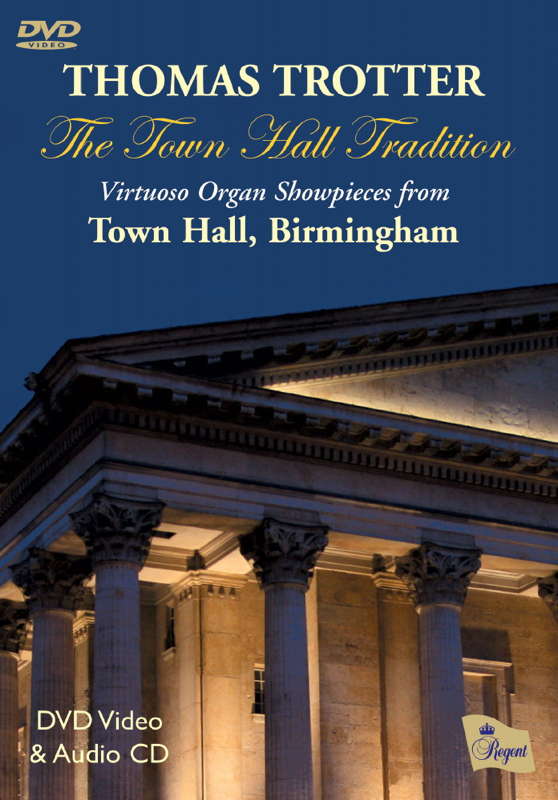
A vivid portrait of Thomas Trotter on
REGDVD 001. © 2011 Regent Records
Trotter's role as City Organist entails giving recitals at both venues. The Town Hall instrument has six thousand pipes: more or less the same as Symphony Hall, and double what it had when the original William Hill organ, one of the first four-manuals in the UK - as opposed to France - opened in 1834. It subsequently went through three revamps, by Hill (again), Willis and Mander.
Nowadays, after a much-hailed launch on Decca (and its subsidiary, Argo) Regent has emerged as Trotter's favoured outlet. And now he is one of their most special executants, amid their handsome array of performers. In addition to the handful mentioned above, Trotter's offerings include a delicious bundle of Liszt, and the exquisite output of Maurice Duruflé. How about Dukas' endlessly entertaining The Sorceror's Apprentice? He's made a recording specifically, and triumphantly, devoted to transcriptions, ending with Wagner again - the 'magic fire' music from The Valkyries.
There's a mainly eighteenth century concoction called 'From Palaces to Pleasure Gardens'; elsewhere, sixteen movements by Schumann; seventeen by Carl Philipp Emanuel (C P E) Bach, on 314 (plus his youngest brother, Johann Christian, on 526); twenty-two unusual pieces by Elgar (who adored Schumann) on 256. Equally enriching, on Decca or Argo, Marcel Dupré, Widor, Messiaen, the tragic Jehan Alain, plus the equally sadly short-lived Julius Reubke (1834-58): his Sonata on the 94th Psalm, in C minor. It's an organ masterpiece as magnificent as the Birmingham concert's Liszt Fantasia which climaxed Trotter's recital, and one deeply influenced by, indeed deriving from, Liszt's huge Piano Sonata in B minor.
The combination of Thomas Trotter and Regent is proving one of the outstanding pairings in British discography. There is more to say about the great success of the latter: perhaps best in a further article.
Copyright © 18 October 2023
Roderic Dunnett,
Coventry UK



